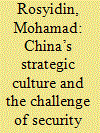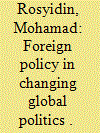| Srl | Item |
| 1 |
ID:
154436


|
|
|
|
|
| Summary/Abstract |
The most challenging task in creating peace in the South China Sea is how to deal with Chinese assertive behavior. This is important since many proposals of the regional security architecture have failed to engage China in order to establish a long-lasting peace in the region. This paper seeks to explain the failure of security management in the South China Sea. Using the concept of strategic culture deriving from constructivism in International Relations, this paper argues that China’s strategic culture is the main factor behind the aggressive behavior in the South China Sea. This culture is rooted from the pre-modern China’s history that has distinct perspective from the Westphalian international law with regard to territorial disputes. This cultural dimension, not the material one, is the key to rethinking security management in the region.
|
|
|
|
|
|
|
|
|
|
|
|
|
|
|
|
| 2 |
ID:
166612


|
|
|
|
|
| Summary/Abstract |
In the South China Sea, China neither implements power-maximizing policy nor engages a peaceful approach. Instead, China implements both coercion and cooperation in pursuing its strategic interest in the disputed area. How can we explain China’s paradoxical behavior? This article claims that the best way to explain China’s policy in the South China Sea is to understand the character of dualism in China’s strategic culture. Following constructivist theory that stresses culture, this article argues that Chinese duality approach in the South China Sea is rooted in the philosophy of Daoism. The symbol of Yin-Yang depicts Chinese assertive as well as cooperative behavior in dealing with the South China Sea dispute. Although from a normative perspective Daoism recognizes pacifism and non-violent behavior, the most important feature of Daoism is the assumption that reality consists of two opposing elements that are mutually embedded.
|
|
|
|
|
|
|
|
|
|
|
|
|
|
|
|
| 3 |
ID:
154722


|
|
|
|
|
| Summary/Abstract |
Since President Jokowi came to power in October 2014, Indonesia’s foreign policy has undergone fundamental change, most obviously in the state’s emphasis on domestic priorities rather than global engagement. Although Jokowi’s foreign policy has pursued an ‘active’ principle by participating in many international forums, it seems to have overlooked the changing contexts of the geopolitical turn. Asia has been rising and is becoming the geopolitical center of gravity in the 21st century. Yet, instead of adapting to this shift, Indonesia’s foreign policy continues to neglect the ‘Asian Century’ turn that has been taking place for years. Indonesia should have increased its international profile to enhance its status as a ‘Third Asian Giant’ beside China and India, but Jokowi’s administration has not taken such an opportunity. This article argues that Indonesia is not interested in gaining international status because of the domestically focused nature of its foreign policy. Indonesia is seen as needing to consolidate its own national resilience before asserting itself in a wider international arena. For Jokowi, national interest is defined as material—primarily economic—interest. In addition, Indonesia’s traditional status as a regional, middle level international power prevents the country from seeking any greater global status. This article argues, with optimism, that Indonesia should seek to change this traditional paradigm of middle power status. It suggests that the assertion of global status matters in Indonesia’s foreign policy because the better the country’s position in the international hierarchy of states, the easier it will be for the nation to achieve its own domestic interests.
|
|
|
|
|
|
|
|
|
|
|
|
|
|
|
|